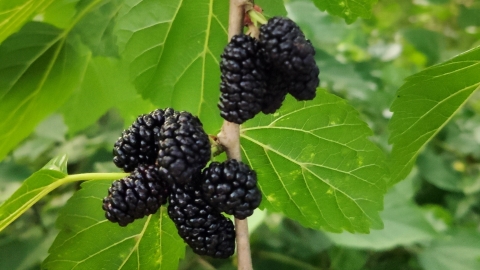Can I eat mulberries during my menstrual period?
Generally speaking, women can eat mulberries during their menstrual period, but they should be consumed in moderation. The detailed explanation is as follows:

Mulberries are rich in vitamin C, vitamin B2, iron, calcium, potassium, as well as antioxidant substances such as anthocyanins and resveratrol. They are low-calorie, high-fiber fruits. Mulberries have a sweet and sour taste, a slightly cold nature, and act on the heart, liver, and kidney meridians. They have the effects of nourishing yin and blood, promoting body fluid production, and relieving dryness. They are commonly used to alleviate symptoms such as dizziness, tinnitus, and insomnia caused by yin deficiency of the liver and kidney.
However, it is important to consume them in moderation. Mulberries are cooling in nature and contain relatively high levels of sugar. Excessive consumption may increase the burden on the gastrointestinal tract, causing discomfort symptoms such as diarrhea and abdominal pain. For individuals with a cold constitution or cold uterus syndrome, symptoms during menstruation may include cold pain in the lower abdomen, dark menstrual blood with clots, cold hands and feet, and sensitivity to cold with a preference for warmth. Since mulberries are slightly cold in nature, they may exacerbate internal coldness, leading to menstrual blood stasis, worsened dysmenorrhea, or reduced menstrual flow.
During the menstrual period, women can consume mulberries in appropriate amounts to supplement nutrients and alleviate menstrual discomfort. However, to avoid unnecessary harm to the body, it is important to control the quantity consumed and avoid overeating. If any discomfort occurs after eating mulberries, it is recommended to seek timely medical attention and consult a professional physician. In daily life, women should also maintain healthy dietary habits and lifestyles to ensure overall health.







